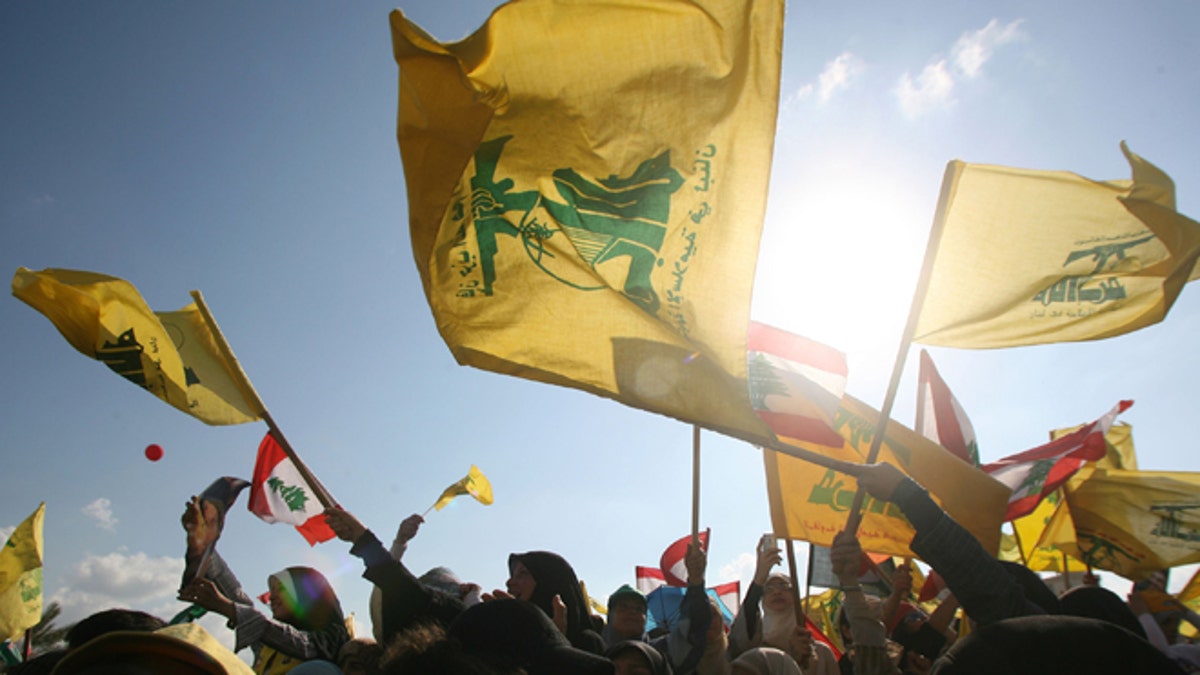
BEIRUT, LEBANON- SEPTEMBER 22: Hezbollah supporters wave flags during a ''Victory over Israel'' rally in Beirut's suburbs on September 22, 2006 in Beirut, Lebanon. Hezbollah leader Sayyed Hassan Nasrallah reportedly said that Hezbollah would not disarm until a Lebanese government capable of protecting the country was in place during the rally. (Photo by Salah Malkawi/Getty Images) (Getty Images)
A senior U.S. military official has once again expressed concern from Washington that Iranian-backed terrorists groups are operating throughout Latin America and working with drug trafficking groups.
Speaking to the Senate Homeland Security and Government Affairs Committee last week, Lieutenant General Ken Tovo – the deputy commander of U.S. Southern Command (SOUTHCOM) – told lawmakers that he was concerned about "the financial and operational overlap between criminal and terrorist networks" in Latin America.
"While there is not yet any indication that the criminal networks involved in human- and drug-trafficking are interested in supporting the efforts of terrorist groups, these networks could unwittingly, or even wittingly, facilitate the movement of terrorist operatives or weapons of mass destruction toward our borders, potentially undetected and almost completely unrestricted," Tovo said in his testimony to Congress.
Speculation has been widespread among U.S. lawmakers and military leaders for a number of years about Islamic extremists groups operating in Latin America, but despite visits by high-ranking Iranian officials – a country known to support terrorist groups – there has been very little hard evidence that these groups are working with drug-trafficking organizations in the Western Hemisphere.
There is, however, more evidence of links between the Lebanon-based Islamic militant group Hezbollah and Lebanese immigrants in Latin America.
"Hezbollah—which has long viewed the region as a potential attack venue against Israeli or other Western targets—has supporters and sympathizers in Lebanese diaspora communities in Latin America, some of whom are involved in lucrative illicit activities like money laundering and trafficking in counterfeit goods and drugs," Tovo said.
He added, "These clan-based criminal networks exploit corruption and lax law enforcement in places like the tri-border area of Brazil, Paraguay and Argentina and the Colón Free Trade Zone in Panama and generate revenue – an unknown amount of which is transferred to Lebanese Hezbollah."
Last November, police documents revealed by Brazilian media conglomerate O Globo tell of links between Hezbollah and the Brazilian prison gang First Capital Command (PCC in its Portuguese acronym). Hezbollah agents operating in the tri-border region, reportedly have supplied weapons to the PCC in exchange for protection of inmates of Lebanese origin in Brazil's prison system.
The suspected Hezbollah-linked traffickers also acted as intermediaries in the sale of C4 explosives that the PCC stole from Paraguay.
These connections between the two groups apparently date back to 2006 and first surfaced on the Brazilian police's radar in 2008.
Tovo added that Iran has established more than 80 cultural centers in the region – in an attempt to counter American influence in the region and circumvent U.S. sanctions.
"As the foremost state sponsor of terrorism, Iran's involvement in the region and these cultural centers is a matter for concern, and its diplomatic, economic and political engagement is closely monitored," he added.
Earlier this month, Fox News obtained photos of a meeting, believed to have taken place in 2009, between the commander of the notorious Iranian Basij paramilitary force, Brigadier General Mohammad Reza Nadqi, and the late Venezuelan president Hugo Chávez.
The assessment is that Tehran advised Caracas on the development and use of brutal civilian militias known as "colectivos," which were modelled after Basij units.
"There's a lot of similarities in the actual results, the killings, there's also similarities in the tactics, clandestine communication techniques that these colectivos didn't have previously – espionage, intelligence, the ability to infiltrate student movements like they didn't before," Joseph Humire, executive director of the Center for a Secure Free Society told Fox News.
Citing last year's arrest of 19 Muslims from Trinidad in Venezuela for conducting training with high-powered weapons, the SOUTHCOM deputy commander added that some nations in Latin America have expressed concern about the increasing number of suspected Islamic extremists who are traveling to Syria to participate in jihad.
"When these foreign fighters return, they will possess operational experience, ties to global extremists and possible intent to harm Western interests – and they will reside in a region rife with smuggling routes that lead directly and easily into the United States," Tovo said.
